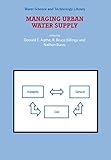Managing urban water supply [Libro electrónico] / editors: Donald E. Agthe, R. Bruce Billings, Nathan Buras
Agthe, Donald E [editor] | Bruce Billings, R [editor/a] | Buras, Nathan [editor/a].
Tipo de material: Libro
en línea Editor: Dordrecht: Springer science, c2003Descripción: xxv, 274 páginas : gráf., mapas ; centímetros.ISBN: 9048164702; 9789048164707; 9789401702379 (Online).Nota de acceso: Disponible para usuarios de ECOSUR con su clave de acceso Nota de bibliografía: Incluye bibliografía e índice Número de sistema: 57411Resumen:
Libro
en línea Editor: Dordrecht: Springer science, c2003Descripción: xxv, 274 páginas : gráf., mapas ; centímetros.ISBN: 9048164702; 9789048164707; 9789401702379 (Online).Nota de acceso: Disponible para usuarios de ECOSUR con su clave de acceso Nota de bibliografía: Incluye bibliografía e índice Número de sistema: 57411Resumen:| Tipo de ítem | Biblioteca actual | Colección | Signatura | Estado | Fecha de vencimiento | Código de barras |
|---|---|---|---|---|---|---|
| Libros | Biblioteca Electrónica Recursos en línea (RE) | Acervo General | Recurso digital | ECO400574113044 |
Incluye bibliografía e índice
Disponible para usuarios de ECOSUR con su clave de acceso
We, the editors, have long believed that a strong knowledge of relatively simple economic and engineering concepts is valuable in solving water management problems. The lack of such knowledge has been apparent to us in some of the journal articles, research proposals and books we have reviewed. The articles which have been written concerning specific local water economies and management issues are scattered over a wide variety of journals, making them hard to access. Most of the extensive water resources literature is concerned with large regional water projects or with narrow technical and regional issues. This book was written to make practical economic and engineering concepts readily available to urban water supply managers, thereby filling a gap in the available literature. It is concerned with decisions made daily, monthly, or annually by managers of urban water supply systems. The book includes basic chapters presenting supply and cost concepts, calculation of demand elasticities, use of marketing concepts, public goods analysis, water markets, industrial water demand and the use of price in water conservation. The authors have included multiple examples of how these concepts can aid in managing urban water supply. The water provider is generally a governmental entity or regulated private utility. Most books on public utilities and their management emphasize gas, electricity, or telephone rather than water. Water is different because of m or variations in quality by source and the necessity for proper disposal of waste water. eng
Disponible en línea
Disponible en formato PDF
Subscripción a ELSEVIER 26 de diciembre del 2013
